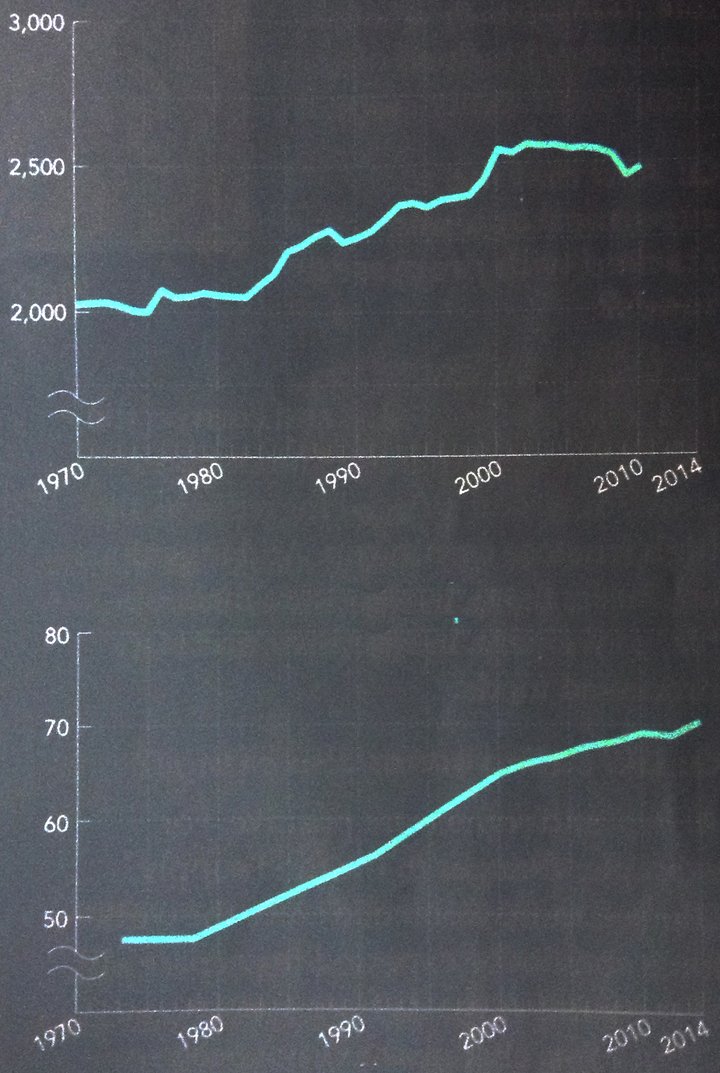It’s sexier to follow a social media influencer’s 30-day detox plan than to read and evidence-based book about the life-lengthening benefits of walking.
— Dr. Charlotte Markey, U.S. News & World Report, 9/26/18
###
Diets don’t work. Of course. More people have died of starvation than ever died of diabetes, heart disease, stroke, fill-in-the-blank. Our bodies learned this long, long ago and now react quickly and decisively in the face of any attempt to reduce calories, aka diet. When we lose weight, our appetite increases (about 45 calories per day for every pound of weight lost — google “leptin” and “ghrelin” to understand how it works) and we burn fewer calories — that is, our metabolism becomes more efficient. How much more? For every pound of weight lost, the number of calories “burnt” daily decreases by between 10 and 15. All of which was good news for our ancestors facing starvation on the savannah, but bad news for Americans trying to lose their spare tires.
In a nutshell: Dieting results in diminishing returns. At first, you’ll lose weight, then — after a few weeks — your weight loss diminishes and your hunger increases. Typically, assuming you stick to your diet, you’ll hit a plateau after six months or so. Which is incredibly discouraging. Ask anyone who’s struggled with weight loss. Typically, not only do dieters lose their motivation and return to their pre-diet weight, but two-thirds of them end up weighing even more than when they started.
This, we’ve known for decades, since serious, long-term research on body metabolism began in the 1970s. That happens to be the same era that the Nixon administration — the USDA specifically — incentivized farmers to grow more corn and soybeans, that is, to produce more calories cheaply. (This wasn’t a government plot to create a nation of fat people; it was more like good intentions that went bad from people who had lived through the Depression.) One result was the availability of cheap high-fructose (that is, high calorie) corn syrup that inevitably found its way into our food and drink. The legacy of decisions made half a century ago lives on in cheap, refined, convenient, ultra-processed food: cereal bars, hot dogs, soda, cookies and all the rest. When calories in the food supply began rising around 1980, so did our average weight. Today, some 60% of the calories we consume come from ultra-processed foods, meaning that, as a nation, we’re eating nearly 300 calories a day more than in 1970.

As go calories, so goes weight. Top: average calories/person/day. Bottom: Percent of overweight or obese adults. (USDA and National Center for Health Statistics, adapted from graph in Nutrition Action Newsletter, July/August 2018.)
And (duh!) we’re fatter. Using the rough-and-ready Body Mass Index (BMI) as a guide, with 25 and up being overweight (30-plus is obese), two-thirds of adults and one third of children in the United States are overweight. Meaning that in most (not all, by any means) we’re unhealthier. On balance, compared to under-25-BMI folks, overweight people are more prone to heart disease, stroke, cancer, type 2 diabetes, impotence, sleep apnea, bone disease, you-name-it. Yes, you can be overweight and metabolically healthy (i.e. not having elevated blood pressure, insulin resistance or LDL cholesterol), but the odds are against it.
So if you want to lose weight, what to do? First, look beyond the averages. Diets don’t work — except tell that to the 10,000 people who have lost, and kept off, an average of 66 pounds since they registered with the National Weight Control Registry, which started collecting data in 1994. Most of them have permanently reduced their calorie intake (mostly by avoiding ultra-processed food), exercise for an hour a day, eat breakfast, watch less than 10 hours of TV a week and weigh regularly.
More to the point, forget the fad image-over-substance diets. We’re talking life-long (and hopefully long-life) changes here. The trick seems to be in choosing the healthiest diet that you believe can stick to, permanently — which means enjoying it, not begrudging it. And to move, regularly and happily. And to lobby for the government to increase the paltry 4% of agricultural subsidies that go towards fruit and vegetables.
CLICK TO MANAGE